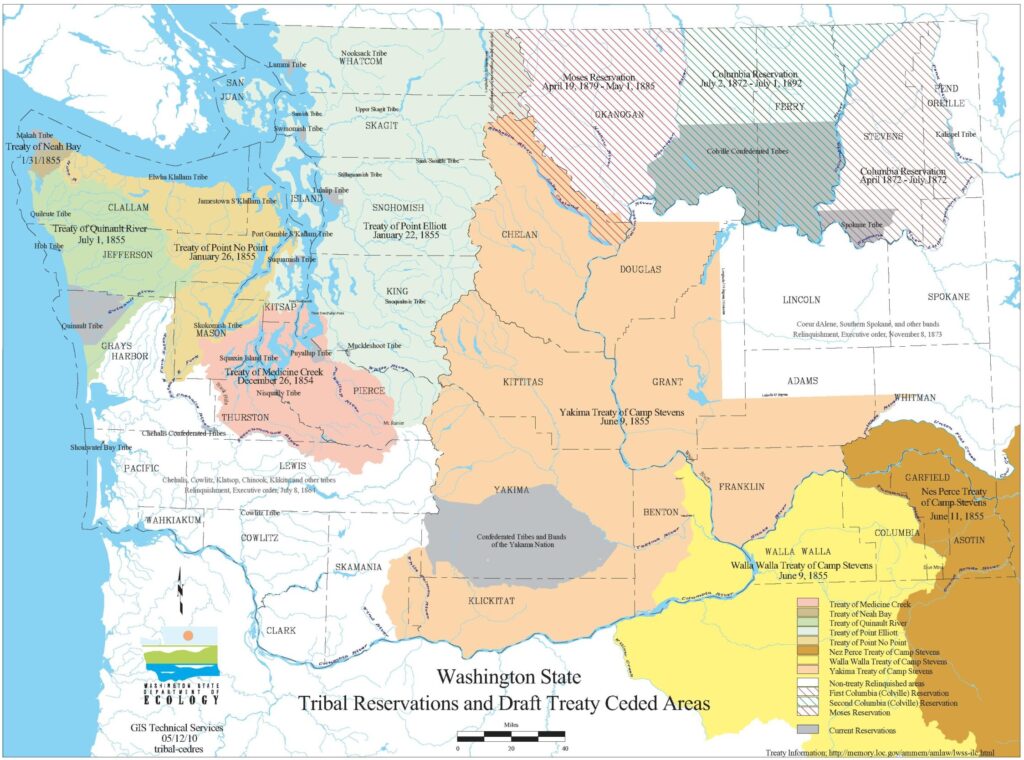The Growth Management Act requires some cities and counties to include a climate resilience element within their comprehensive plans. Many tribes have their own comprehensive plans that have a climate resilience element, as well as expertise developing climate adaptation plans. Collaborative planning efforts may help identify mutual priority actions and strategies that can inform neighboring jurisdictions.
Tribes may choose whether or not to formally participate in local processes for comprehensive planning. If tribes decline to participate, jurisdictions should still share updates and invite tribal input throughout the planning process.

Local Governments and Tribes
For local governments, tribal engagement can be conducted at a level of tribal coordination — informal engagement with tribal communities through conversations focused on information sharing with tribal staff. Tribal coordination also includes working with Indigenous groups that are not tribal governments, such as urban Native American organizations and/or tribal populations not located in their Indian Country. This might include non-federally recognized tribes, Native American non-profits and Indigenous community-based organizations. It is important to understand the distinction between working with federally recognized tribes who are self-governing sovereign nations and other Native American groups.
Jurisdictions should reach out to tribes that have reservation lands, ancestral lands and waters, and/or “usual and accustomed areas” neighboring their jurisdictions. Local governments have a legal responsibility to uphold sovereignty and treaty rights by consulting with tribal governments to reach consensus. Jurisdictions should consider how to approach tribal engagement in a culturally appropriate manner by learning about neighboring tribes through research, talking to mutual contacts and visits to cultural heritage centers.
Key information about Washington’s tribal governments and their reservations can be found online at the Governor’s Office of Indian Affairs: www.goia.wa.gov.
New requirements in 2022 (HB 1717)
- RCW 36.70A.040 – Allows tribes to voluntarily participate in the local governments’ comprehensive planning process.
- RCW 36.70A.085 – Cities with a Port element must collaborate development with the city, port, and tribe(s).
- RCW 36.70A.106 – Requires Commerce to share submittals with tribes. Tribes will indicate to Commerce which jurisdiction’s submissions will be transmitted.
- RCW 36.70A.110 – Requires local jurisdictions to work with tribes to coordinate urban growth. Tribes must opt-in to coordinate with the jurisdiction.
- RCW 36.70A.190 – Requires Commerce to provide facilitation services. Federally recognized tribes may request assistance from Commerce to resolve issues related to proposed changes to local comprehensive plans and development regulations.
- RCW 26.70A.210 – Requires counties to invite tribes to participate in developing countywide planning policies. Counties must develop policies for the protection of tribal cultural resources in collaboration with tribes if they choose to participate.
Resources
- Washington State Department of Commerce PlanView
- Governor’s Office of Indian Affairs
- Washington State Treaties
- Federally Recognized Tribes
- Washington State Department of Archaeology and Historic Preservation
- Washington State Department of Fish & Wildlife
- Washington State Department of Transportation Tribal Contacts
- Washington State Department of Ecology’s Map of Tribal lands in Washington (PDF)
- Washington State Department of Ecology’s Map of Tribes and Reservations within Washington (PDF)
- Puget Sound Regional Council Coordination with Tribes in Comprehensive Planning (PDF)
Tribal Engagement is an overarching term that encompasses all levels of tribal communication and partnership, from informal coordination to formal government-to-government consultation. Federally recognized tribes retain their rights as sovereign nations to a direct government-to-government relationship with the federal government, independent of the state or local jurisdictions. Tribal Sovereignty is a legal term that means the right of a people to self-govern within jurisdictional borders. According to Washington Tribes, “Tribal sovereignty recognizes that American Indian tribes have the political status of nations and that Indian nations are located within the territorial boundaries of the United States. As sovereigns, tribal nations have a government-to-government relationship with the two other sovereign governing bodies in the U.S. — the federal and state governments.”
At Commerce, we engage with tribes in a few different ways including:
- Archaeological and historical project reviews
- Informal tribal coordination
- Informal tribal consultation
- Formal government-to-government consultation

